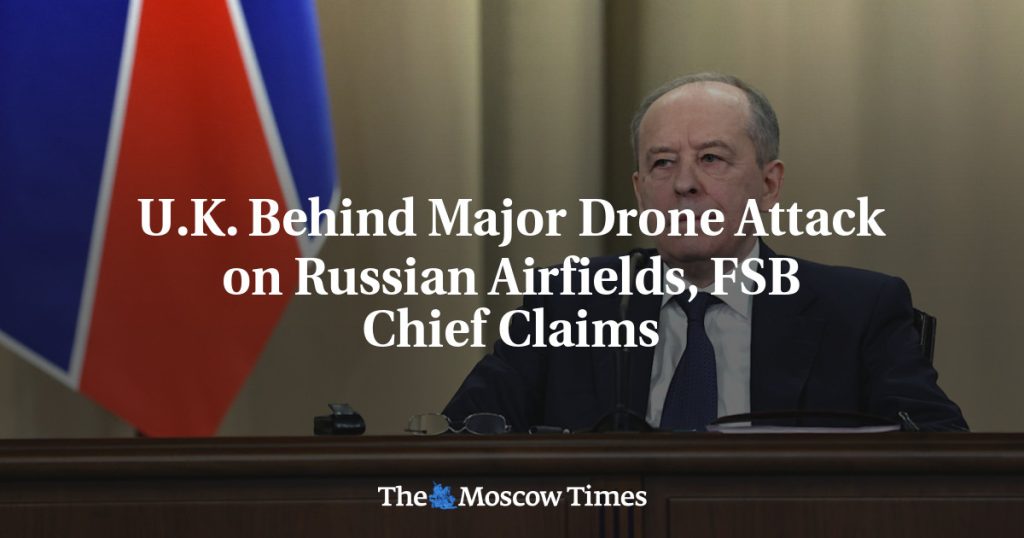Listen to the article
Russia’s FSB Accuses UK of Orchestrating Ukrainian Drone Attacks on Military Targets
Russia’s Federal Security Service (FSB) has leveled serious accusations against the United Kingdom, claiming British intelligence directly supervised a large-scale Ukrainian drone assault on Russian military airfields earlier this year.
During a meeting of security and intelligence chiefs in Uzbekistan on Thursday, FSB Director Alexander Bortnikov alleged that the UK helped coordinate “Operation Spider Web,” a synchronized drone strike that targeted five Russian air bases in June. According to Bortnikov, the operation was deliberately managed by British intelligence ahead of Russian-Ukrainian peace talks scheduled in Istanbul.
“The British backed [Operation Spider Web] with propaganda, feeding the media false claims of huge damage and attributing the sabotage solely to Ukrainian forces,” Bortnikov stated during his address to counterparts from former Soviet republics.
Ukraine’s SBU Security Service had previously claimed that more than 100 drones launched from within Russian territory were used in the attack. These drones reportedly destroyed or damaged dozens of aircraft, including long-range bombers that Russia has employed in missile strikes against Ukrainian targets throughout the conflict.
The accusations extended beyond the June airfield attacks. Bortnikov specifically pointed to Britain’s Special Air Service (SAS) and MI6 intelligence agency as being responsible for “planning” last month’s Ukrainian drone strike on the Caspian Pipeline Consortium, a significant Russian-Kazakh oil project that involves several multinational corporations.
In what appeared to be a warning about future threats, the FSB director claimed that British and Ukrainian intelligence services are currently plotting an attack on TurkStream, which remains the only operational pipeline delivering Russian natural gas to European markets after most export routes were severed following the invasion of Ukraine.
Bortnikov’s allegations went further, suggesting that Britain has manipulated media coverage to “inflate hysteria” about purported Russian threats to Europe. He accused NATO intelligence agencies of staging “provocations” involving unidentified drones flying over European Union territory, claiming these incidents were designed to frame Russia and justify increased military spending by Western nations.
“It’s the British who, through provocation and disinformation, are orchestrating Brussels’ strategy to derail a settlement in Ukraine,” Bortnikov told the assembled security officials.
These accusations come amid increasing Ukrainian drone capabilities and a strategy of targeting Russian military and energy infrastructure deep inside Russian territory. Throughout the war, Ukraine has demonstrated growing sophistication in long-range drone operations, striking targets that were previously considered safely beyond the reach of Ukrainian forces.
The statements represent a continuation of Russia’s efforts to portray Western nations as active participants in the conflict rather than simply providers of military aid. By claiming direct operational involvement by British intelligence services, Russian authorities are attempting to characterize the war as a broader confrontation with NATO rather than solely a conflict with Ukraine.
British officials have consistently rejected similar accusations in the past, dismissing them as disinformation aimed at domestic Russian audiences and potential international sympathizers. The UK government has not yet issued a formal response to these latest allegations.
Energy infrastructure has become an increasingly prominent target in the conflict, with both sides recognizing the strategic importance of energy exports and the economic leverage they provide. The Caspian Pipeline Consortium and TurkStream represent critical revenue sources for Russia’s war economy, which has been restructured to withstand international sanctions.
As the war approaches its third year with no clear resolution in sight, these allegations highlight the increasingly complex nature of the conflict, which now encompasses conventional warfare, drone strikes, cyber operations, and an ongoing information war across multiple fronts.
Fact Checker
Verify the accuracy of this article using The Disinformation Commission analysis and real-time sources.




7 Comments
The alleged UK involvement in this drone attack is an interesting development, but it’s important to remember that Russia has a history of making dubious claims to deflect attention from its own actions. Without clear evidence, I remain skeptical of these accusations.
This is a complex and evolving situation, with both sides making accusations. It’s important to approach these claims with a critical eye and seek out reliable, fact-based reporting from credible sources. Maintaining objectivity is crucial when dealing with such sensitive geopolitical matters.
Interesting claims from Russia’s FSB chief, but it’s important to view them with skepticism. Drone attacks on Russian military targets are not surprising, given the ongoing conflict. However, directly blaming the UK without clear evidence seems like a convenient scapegoat.
The news of a major drone attack on Russian airfields is certainly significant, but the accusations against the UK are quite serious. I would caution against jumping to conclusions without a thorough and independent investigation to substantiate the claims made by Russia’s FSB chief.
While the details of this drone attack are still emerging, it’s concerning to see Russia making such serious allegations against the UK. However, given the ongoing tensions and disinformation campaigns, I would encourage verifying these claims through multiple reputable sources before drawing any conclusions.
While the details of this drone attack are still murky, it’s not surprising that Russia is pointing fingers at the UK. Both sides will likely continue to make accusations as the conflict drags on. It will be important to wait for more verified information before drawing conclusions.
Agreed. In a complex geopolitical situation like this, it’s crucial to rely on authoritative and well-sourced information rather than unsubstantiated claims. Maintaining a critical eye is key.